Peng, Lianshu, Yida Wang, and Zhensheng Pan. "A Modeling Study of Insurance and Real Estate Risk Assessment in the Context of Global Climate Change". Beijing University of Posts and Telecommunications. 2024. https://drpress.org/...
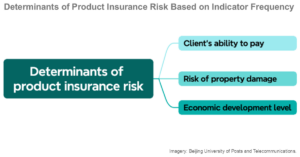 Catastrophic losses from extreme weather events are on the rise across the world, severely testing the capital reserves and claims-paying capability of many insurers. The total damage and economic loss from the Los Angeles fires alone is now estimated to be between $250 billion and $275 billion. Of this, insurers are expected to see at least $30 billion in reported losses and at least another $10 billion for uninsured losses. As the effects of global climate change become more pronounced, the frequency and intensity of extreme weather events are increasing, posing significant challenges to the insurance industry and creating an urgent need for sustainable development. Such catastrophic weather events are increasingly becoming an existential crisis for property owners and insurers.
Catastrophic losses from extreme weather events are on the rise across the world, severely testing the capital reserves and claims-paying capability of many insurers. The total damage and economic loss from the Los Angeles fires alone is now estimated to be between $250 billion and $275 billion. Of this, insurers are expected to see at least $30 billion in reported losses and at least another $10 billion for uninsured losses. As the effects of global climate change become more pronounced, the frequency and intensity of extreme weather events are increasing, posing significant challenges to the insurance industry and creating an urgent need for sustainable development. Such catastrophic weather events are increasingly becoming an existential crisis for property owners and insurers.
Posted on 15/01/25
Recent Abstracts
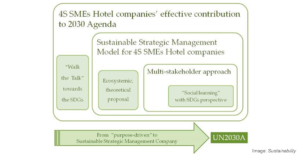
Sustainable Strategic Management Model for Hotel Companies: A Multi-Stakeholder Proposal to ‘Walk the Talk’ toward SDGs
This paper proposes a sustainable strategic management model (SSMM) for small- and medium-sized (SME) hotel companies, which have to contribute to the 2030 Agenda. Adding the SDG perspective, it is a holistic proposal with a multi-stakeholder approach to enable them to focus on the well-being of people and the planet. ...
Posted on 15/11/21
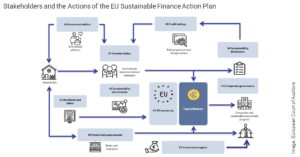
Will the EU Taxonomy Regulation Foster a Sustainable Corporate Governance?
EU securities regulation has established a taxonomy of environmentally sustainable financial activities that potentially supports sustainable corporate governance. This paper argues that including environmental sustainability in EU mandatory disclosure aligns the incentives of institutional investors with the interest ...
Posted on 14/11/21
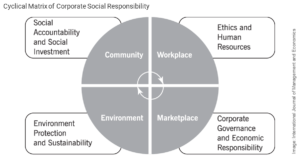
Accountability by Design? Exploring Design Characteristics of Corporate Social Responsibility Standards
Corporate social responsibility (CSR) standards are widely adopted instruments for supporting firms in becoming more accountable, while noncompliance limits their effectiveness and legitimacy. This paper investigates the design of 50 CSR standards across different standard types (principle-based, reporting, certificat ...
Posted on 14/11/21
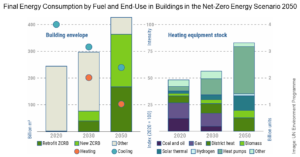
Global Status Report for Buildings and Construction: Towards a Zero‑Emission, Efficient and Resilient Buildings and Construction Sector
To limit additional global warming to below 2 degrees Celsius, countries have adopted policies and codes that have a future impact on the emissions and energy efficiency of buildings. Building emissions need to be reduced along their life cycle through a combination of reducing energy demand, decarbonizing the power s ...
Posted on 13/11/21

Ecocide as an International Crime
One solution to the widespread or long-term damage to the environment gaining support is to make ecocide a crime and punishable by international justice. Major events that massively destroy ecosystems would thus fall under the jurisdiction of the international criminal court. This would allow citizens to hold compani ...
Posted on 13/11/21
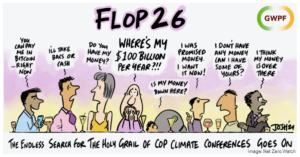
EU Accused of Being the ‘Missing Leader’ at COP26 Climate Talks
The role of the EU in the UN climate process has traditionally been to drive the talks and build the needed high ambition coalition. But, according to green groups, diplomats, observers and allies, the EU appeared at COP26 ineffective, constrained and inept at times. Where the EU was present and represented in negoti ...
Posted on 12/11/21
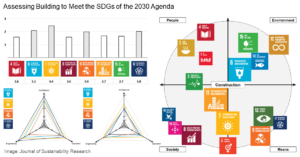
On the Role of Construction in Achieving the SDGs
Construction and real estate have been central to the debates on sustainable development. Where the dominant definition of sustainability in the built environment focuses on the environmental dimension, the UN Sustainable Development Goals (SDGs) offer new opportunities for the building sector to expand its focus. Gre ...
Posted on 12/11/21
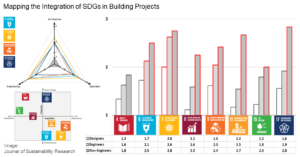
Integrating the Sustainable Development Goals in Building Projects
Building designers are attempting to integrate the 2030 Agenda and its Sustainable Development Goals (SDGs) into projects. This has limited the development of novel approaches as well as new building design methodologies that specifically aim at attaining the agenda’s targets. To help building design teams achieve th ...
Posted on 11/11/21
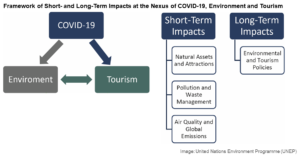
COVID-19, Environmental Impacts, and Implications for Tourism
Tourism in many countries, particularly in developing economies, depends largely on such natural assets as forests, coastlines and wildlife and are linked to such environmental conditions as clean air and water. Given the interdependency of tourism and the environment, the environmental impacts of COVID-19 have short- ...
Posted on 10/11/21
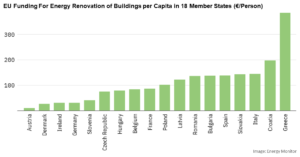
Europe Fails to Act on Energy Waste in Recovery and Resilience Plans
At least 37% of the EU Recovery and Resilience Facility (RRF) for pandemic recovery funding must be spent directly on climate-related actions. This study of the National Recovery and Resilience Plans (NRRPs) in 18 member states reveals that only 8% on average is allocated to energy renovation. Austria is the worst pe ...
Posted on 09/11/21
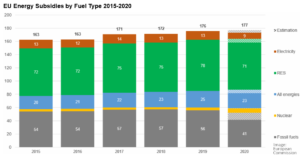
EU Prepares to Include Nuclear and Gas in Green Investment List
EU countries have been arguing for three years whether to include nuclear and gas as green investments in the taxonomy. The decision will shape EU climate and energy policy for decades and have effects far beyond the financial sector. France, the UK, and Eastern European countries threatened to veto the EU taxonomy ...
Posted on 09/11/21

German Politicians Affirm Rejection of Nuclear Power in EU Sustainable Finance Taxonomy
Germany's environmental minister from the Social Democrats (SPD), Svenja Schulze, has affirmed that the country will work towards excluding nuclear power from the EU taxonomy for sustainable investments. She says that they don’t want nuclear energy, don’t think it’s sustainable, and don’t want the EU to support it. T ...
Posted on 08/11/21
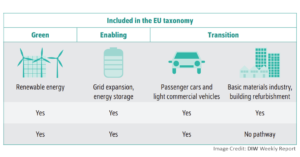
The EU Taxonomy
Different standards and metrics make it difficult for investors to compare green investments. The EU taxonomy establishes a standardized and transparent system for classifying and investing in sustainable economic activities. The taxonomy operates on the project level and the firm level. The project level considers t ...
Posted on 08/11/21
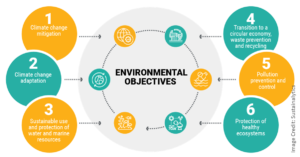
EU Taxonomy for Identifying ‘Sustainable Economic Activities’
The EU taxonomy is a classification system that establishes a list of six "environmentally sustainable economic activities". It defines which economic activities are deemed to be environmentally sustainable to help the EU scale up the needed "sustainable investment" to become "climate neutral" by 2050. Unclear defini ...
Posted on 08/11/21
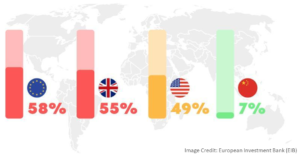
On Climate Change, Government Trust Desperately Needs to Be Restored
75% of EU citizens are more concerned with the climate emergency than they think their government is. Around half say the difficulty in solving the climate crisis is mainly because of government inactivity. Most consider climate change the biggest challenge of this century and believe that a radical change in habits ...
Posted on 07/11/21

